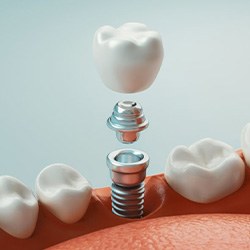Dental Implants – Fort Smith, AR
The Most Comprehensive
Tooth Replacement Solution

Over the last 50+ years, realistic tooth replacements have only become more accessible. Today, dental implants are widely considered to be the ideal tooth loss solution thanks to their longevity, durability, aesthetics and, of course, functionality. Out of all the options available, dental implants come the closest to resembling natural teeth. Dr. Gilberto López partners with the best oral surgeons in the area to ensure patients receive the highest standard of care. To learn more about what dental implants in Fort Smith can do for your smile and overall quality of life, call our team at New Smile Dental: Gilberto Lopez, DDS today!
Why Choose New Smile Dental: Gilberto Lopez, DDS for Dental Implants?
- Partners with Expert Oral Surgeons
- Friendly, Spanish-Speaking Dentist and Team
- Low-Interest Dental Financing Available
What Are Dental Implants?

Traditional tooth replacements, like dental bridges and dentures, only recreate the crowns of the teeth – the part that you can see above the gumline. Dental implants go one step further by also replicating the tooth’s root structure. They consist of three parts:
- A biocompatible titanium post that is surgically inserted into the jawbone
- A restoration (dental crown, bridge, or denture) that mimics your natural teeth
- A metal abutment that connects the two
Just like the root of a real tooth, the dental implant fuses with the jawbone until they’re fully attached. This process of osseointegration is what allows implants to feel natural, look incredibly lifelike, and last for decades!
The 4 Step Dental Implant Process

Unlike getting temporary tooth restorations like traditional dentures or dental bridges, dental implant treatment requires a unique, multi-step process that spans several months. Although this may seem like a long time, the long-term benefits of this procedure are well worth the wait.
At New Smile Dental, we partner with expert oral surgeons in the Fort Smith area to help you restore your smile exactly how you want it. While every patient’s treatment will look slightly different, there are four main steps you can expect to complete: the initial consultation, surgery, osseointegration, and the final delivery of your restoration.
Initial Dental Implant Consultation

At your consultation, Dr. Lopez will review your oral health and medical history to determine if you’re a good candidate for treatment. If necessary, he will work with you to complete any preliminary procedures needed, such as gum disease therapy, tooth extractions, or bone grafting.
Once these are completed, we can move on to planning the rest of your dental implant treatment. We’ll walk you through step-by-step what you can expect next, including the timeline and cost of your entire procedure.
Dental Implant Surgery

At New Smile Dental, we partner with skilled local surgeons to complete your dental implant surgery. This allows you the benefit of their expertise in placing your dental implant, along with the trusted care you’ve come to rely on from Dr. Lopez and the team.
Your dental implant surgery itself should be relatively straightforward. First, your mouth will be numbed. Then, the surgeon will make an incision in your gums, place the implant posts in your jawbone, close the incision, and then place protective caps over your implant posts. Once this is complete, you will be able to go home and rest. Plan on taking two or three days off from work and strenuous activities to recuperate.
Dental Implant Osseointegration & Abutment Placement

The next step is the osseointegration process. This is an integral part of the healing process where the implant fuses with the jawbone. Typically, this process takes about three to six months. Once it is complete, you will need another small surgery to attach the abutments to your dental implants. These are the pieces that hold the teeth (crowns) to your implant. As you heal from the abutment surgery, the lab will be busy at work crafting the crowns from the impressions taken of your mouth!
Delivery of Dental Implant Restorations

The final step in your dental implant journey is getting your crowns, bridge, or denture placed. At this appointment we’ll also check to make sure your bite is comfortable. If it is, you’ll be free to go and enjoy your newly restored smile!
Benefits of Dental Implants

It would be amazing if our teeth would last our entire lives. However, many people end up losing one or more teeth over time. This can happen thanks to decay, injuries, gum disease, and other reasons. The good news is that dental implants are available to restore the root and crown of the teeth. Because of this, there are numerous unique benefits you can expect. Read on to learn more about the advantages of choosing dental implants.
Day-to-Day Benefits

Dental implants feel just like natural teeth do, so you shouldn’t notice them too much in your day-to-day life. Ultimately, you should be able to enjoy all the things you did before losing your teeth. Here are some of the benefits that you can experience from day to day:
- Restore Bite Force: Your bite force can be restored by 80% or even higher! This is much more than you can experience with dental bridges or dentures.
- Easy Maintenance: You care for dental implants the same way as you care for natural teeth. Brush, floss, rinse, and see your dentist for regular checkups.
- Increased Confidence: You don’t need to worry about visible gaps in your smile or ill-fitting restorations.
Health Benefits

In addition to the noticeable benefits that you will experience daily, your health will also be positively influenced by your new addition. Here’s what you can look forward to:
- Improved Oral Health: This means a lower risk of cavities, gum disease, infection, and additional tooth loss. None of your natural teeth need to be altered for this restoration either.
- Better Overall Health: Having excellent dental health has a positive influence on your overall health. It even lowers your risk of serious medical problems, like diabetes and heart disease.
- Prevents Bone Loss: When you’re missing teeth, jawbone deterioration will follow. Dental implants stimulate the jawbone just like natural tooth roots to keep it strong.
Long-Term Benefits

By choosing dental implants, you are making a long-term investment in your smile. Here are some benefits that you can experience many years down the line:
- Implant Success: Dental implants are very successful with a success rate of over 95%. Your chances of experiencing an implant failure are very low.
- Permanent: Dental implants can last upwards of 30 years with proper maintenance.
- Save Money: You no longer need to worry about stocking up on adhesives or soaking solutions. There won’t be frequent repairs or replacements either. Dental implants also reduce your risk of many oral health issues, so you won’t need to endure costly treatments that will add up over time.
Who Dental Implants Can Help

Dental implants can be used to replace teeth in a multitude of scenarios. It doesn’t matter if you need to replace a single tooth or you’ve had a denture for many years and want to make it more stable; if you’re a healthy adult who is missing teeth, chances are high that dental implants can meet your needs!
Missing One Tooth
To replace one tooth, a single titanium implant is placed inside your jawbone. After the implant heals, an abutment is placed on top, which connects the all-porcelain, lifelike dental crown to the abutment. This ensures that your smile fully looks natural after treatment.
Missing Multiple Teeth
Dental implants can easily be fitted with dental bridges. By using just two implants on either side of the bridge, you can effectively replace three to four consecutive teeth at a time. Since the implants are anchoring the bridge, you don’t need to remove any existing tooth enamel to secure it in place!
Missing All Teeth
Implant dentures are one of the most popular options for replacing teeth because you only need four to six implants to hold an entire arch at a time. Plus, implant dentures can be designed to be removable or fixed, depending on your preference.
Understanding the Cost of Dental Implants

Understanding the cost of dental implants in Fort Smith isn’t as straightforward as you might think. There are many factors that can affect the price of your treatment, such as the number of teeth you need to replace and what your dental insurance benefits might cover. Oftentimes, it’s not possible to give an accurate estimate until after performing an oral exam and meeting with you for a consultation.
Rest assured, though, our team is here to help! You’re always welcome to contact our team with questions, and we’ll answer them to the best of our ability. If you get in touch ahead of your appointment, we might even be able to confirm your dental insurance coverage.
Preliminary Treatments & Dental Implant Surgery

Preliminary treatments are meant to help ensure the success of your dental implants, so they’re often considered as a separate cost. This umbrella includes gum disease therapy, tooth extraction, bone grafting, and other treatments that address current oral health issues.
The Parts of Your Dental Implant

The three main parts of a dental implant are the titanium post, the final restoration, and the abutment that connects the other two. In general, “larger” restorations like dentures cost more than “smaller” ones like crowns and bridges. Fortunately, an implant denture typically requires no more than four-to-six implant posts, so it’s still a cost-effective option for most patients wanting a modern tooth-replacement.
How Dental Implants Can Save You Money

Though they’re more expensive than traditional restorations, dental implants can help you save money in the long run. Since they last nearly twice as long and are much more durable, dental implants generally require fewer trips to the dentist. You’ll likely need fewer repairs, replacements, and adjustments, and therefore have fewer costs.
Does My Dental Insurance Cover Dental Implants?

Dental implants are still considered to be an “elective” treatment by most dental insurance companies. However, those same companies agree that replacing missing teeth is vital for a patient’s oral health. As such, your benefits may cover other expenses related to your dental implant restoration, such as implant surgery or preliminary treatments.
Making Dental Implants Affordable

Even if you don’t have dental insurance, we can still help you make dental implants more affordable thanks to CareCredit financing. CareCredit is a reputable third-party financier that provides little-to-no-interest monthly payment plans. Enrolling means you’ll be able to pay for your dental implants at your own pace and spread your costs out over multiple paychecks. Many of our patients find financial peace of mind with CareCredit!
Dental Implant FAQs

What do you know about the dental implant process? Below, you’ll find a number of common questions that patients often ask when they’re considering getting new teeth supported by dental implant posts. We hope the answers listed below clear up any concerns you might have, but if not, we invite you to reach out to us; we’ll make sure to answer any question you have to your satisfaction before you commit to getting dental implants.
Are Dental Implants Safe?
Dental implants as we know them today were first placed in 1965; since that time, extensive clinical research and experimentation have shown them to be safe and reliable options for tooth replacement. The oral surgeons that we work with have dedicated years of study to the placement of dental implants, and they’ve performed the procedure many times in the past; your smile will be in good hands. Furthermore, risk factors like a lack of bone density will be identified and addressed long before implant surgery actually takes place, so the risk of failure will be kept as low as possible.
Will I Need a Bone Grafting Procedure Before Getting Dental Implants?
That depends on the state of your jawbone during your initial consultation. The jaw tends to break down after tooth loss due to the loss of stimulation. Thus, if you have been struggling with missing teeth for a while, then the odds are bone loss has already progressed to the point where there isn’t enough bone tissue left for a successful dental implant procedure. However, if you are getting dental implants very shortly after losing your teeth, then there’s a chance that bone grafting won’t be required. Part of your initial consultation will be evaluating the density of the jawbone in order to determine whether bone grafting is a necessary step.
What Can Cause Dental Implant Failure?
A dental implant might fail if:
- An infection occurs in the gum and bone tissue around the post, leading to bone loss and causing the implant to come loose.
- The implant has failed to fully merge with the jawbone.
- An injury has broken or otherwise damaged the implant post.
There are steps you can take to protect your implants, such as good oral hygiene, regular dental visits, and wearing a mouthguard to protect your smile while playing sports. That said, failure might occur on rare occasions despite your best efforts; call us immediately if you notice severe oral pain, swelling of the gums, or loose implant posts.
How Long Will It Take for Dental Implants to Heal?
It usually takes three to six months for the bone to fully join with the dental implant. The exact amount of time can vary quite a bit depending on the exact number of dental implants you need, the current density of your jawbone, and the overall healing capabilities of your unique body. We can give you a more precise timeframe after we’ve had a chance to examine your mouth more closely.
Does Getting Dental Implants Hurt?
You can rest assured that getting dental implants is a comfortable experience. Before the placement procedure begins, your oral surgeon will numb your mouth with local anesthetic. In addition, you will most likely be sedated, lowering your body’s ability to register pain. After your surgery is complete, you may experience some mild soreness for a few days. However, taking prescribed or over-the-counter pain medication as directed can help manage soreness or swelling. You can also press a cold compress to your cheek for 15 minutes off and on. If your discomfort worsens instead of improves after two or three days, contact our office right away.
Do Dental Implants Feel Natural?
Yes! Once your dental implants are fused with your jawbone, they will feel exactly like the roots of your natural teeth. Dental implants are the only tooth replacement solution that restore missing teeth from the roots up. Keep in mind that the implants themselves have no nerve endings. Any sensations that you feel near your implant-supported replacement tooth – heat, cold, pressure, etc. – come from the gums surrounding the implant.
Am I Too Young to Get Dental Implants?
If you are missing teeth and are at least 18 years old, you are likely a good candidate for dental implants. Implant treatment typically is not recommended for minor patients, as their jaws likely are not fully developed. If dental implants are placed before the jaw is finished growing, it could interfere with further bone development and potentially result in complications. In general, most people’s jaws stop growing around the age of 18, but some people’s jaws take until their mid-20s to fully develop. Men’s jaws typically take longer to develop than women’s jaws do.
Do Dental Implants Decay?
No. Because dental implants are artificial and not made of enamel, they cannot get cavities. However, the natural teeth next to your dental implant are still susceptible to tooth decay. In addition, the gums around an implant can also become infected. That’s why practicing excellent oral hygiene is still just as important after you have gotten dental implants. Be sure to brush your teeth (including your implant-supported crown, bridge, or denture) twice a day, floss daily, and visit an implant dentist every six months for a checkup.
Can I Get Dental Implants If I Smoke?
While possible, smokers have a higher rate of dental implant failure compared to nonsmokers. Tobacco use causes dry mouth, slows down healing, and can interfere with the implants’ ability to fuse with the jawbone. Smoking cigarettes can also cause dry socket, a painful condition that occurs when the blood clot that forms over the implant site becomes dislodged. If you’re a regular smoker, try to quit at least two weeks before implant surgery and wait to resume the habit for at least two or three months afterward. Of course, replacing a missing tooth with a dental implant could also be the perfect time to kick the habit for good!
Does Getting Dental Implants Hurt?
You can rest assured that getting dental implants is a comfortable experience. Before the placement procedure begins, your oral surgeon will numb your mouth with local anesthetic. In addition, you will most likely be sedated, lowering your body’s ability to register pain. After your surgery is complete, you may experience some mild soreness for a few days. However, taking prescribed or over-the-counter pain medication as directed can help manage soreness or swelling. You can also press a cold compress to your cheek for 15 minutes off and on. If your discomfort worsens instead of improves after two or three days, contact our office right away.
Do Dental Implants Feel Natural?
Yes! Once your dental implants are fused with your jawbone, they will feel exactly like the roots of your natural teeth. Dental implants are the only tooth replacement solution that restore missing teeth from the roots up. Keep in mind that the implants themselves have no nerve endings. Any sensations that you feel near your implant-supported replacement tooth – heat, cold, pressure, etc. – come from the gums surrounding the implant.
Am I Too Young to Get Dental Implants?
If you are missing teeth and are at least 18 years old, you are likely a good candidate for dental implants. Implant treatment typically is not recommended for minor patients, as their jaws likely are not fully developed. If dental implants are placed before the jaw is finished growing, it could interfere with further bone development and potentially result in complications. In general, most people’s jaws stop growing around the age of 18, but some people’s jaws take until their mid-20s to fully develop. Men’s jaws typically take longer to develop than women’s jaws do.
Do Dental Implants Decay?
No. Because dental implants are artificial and not made of enamel, they cannot get cavities. However, the natural teeth next to your dental implant are still susceptible to tooth decay. In addition, the gums around an implant can also become infected. That’s why practicing excellent oral hygiene is still just as important after you have gotten dental implants. Be sure to brush your teeth (including your implant-supported crown, bridge, or denture) twice a day, floss daily, and visit an implant dentist every six months for a checkup.
Can I Get Dental Implants If I Smoke?
While possible, smokers have a higher rate of dental implant failure compared to nonsmokers. Tobacco use causes dry mouth, slows down healing, and can interfere with the implants’ ability to fuse with the jawbone. Smoking cigarettes can also cause dry socket, a painful condition that occurs when the blood clot that forms over the implant site becomes dislodged. If you’re a regular smoker, try to quit at least two weeks before implant surgery and wait to resume the habit for at least two or three months afterward. Of course, replacing a missing tooth with a dental implant could also be the perfect time to kick the habit for good!
Maintaining & Caring for Your Dental Implants

Do you want your dental implants to remain in place for decades or even a lifetime? Do you want to maintain functionality and experience an easier time eating and speaking when surrounded by others? Do you long to maintain a smile that makes you feel and look good? If so, you’ll want to follow the directions provided by our dental team when it comes to dental implant care. From learning how to properly care for your new teeth to forgoing bad habits and adopting healthier eating habits, you can discover effective ways to take better care of your smile and ensure its permanent placement for years to come.
Making Oral Hygiene a Priority

Brushing and flossing on occasion is no longer an option. Instead, you must be diligent in brushing twice a day for two minutes, using a non-abrasive toothpaste, flossing between meals, and rinsing with an ADA-approved mouthwash. This will eliminate bacteria and plaque that try to cause decay and gum disease, both of which can negatively affect your dental implants.
Eating a Healthy Diet

Sugars and starches may be your go-to snacks, but if you want to avoid peri-implantitis or other potential problems that can arise with dental implants, you’ll need to adopt healthier eating habits. Leafy greens, lean proteins, low-fat dairy, fruits, and vegetables are all acceptable foods to incorporate into your diet. Not only will they work to strengthen your tooth enamel, but they’ll also promote healthier gum tissue and reduce your risk for gum disease.
Breaking Bad Habits

Bad habits are hard to break, but if you want to ensure the longevity of your new teeth, you’ll remain committed to avoiding any of the following practices:
- Smoking
- Eating ice
- Biting your fingernails
- Chewing on inanimate objects (i.e., pens, pencils)
- Using your teeth as tools to open packages and containers
Finding available resources (i.e., cessation groups), practicing mindfulness, and even keeping sugarless gum in your pocket, purse, or desk can help curb the desire to continue these bad habits. As a result, you’ll better protect your dental implants from serious damage and a trip to the emergency dentist.
Protecting Your Dental Implants

Along with giving up your bad habits, you should also plan to invest in a customized mouthguard. This special oral device safeguards your real and artificial pearly whites from serious injury whether you play sports or suffer from stress that causes bruxism. Teeth grinding or a hard hit on the field can lead to damaged teeth that require a visit to the emergency dentist’s office and timely procedures to fix the problem. By wearing a uniquely designed mouthguard that fits comfortably and offers maximum support, you can reduce your risk for serious injury and instead, enjoy a beautiful, damage-free smile.
Scheduling Regular Dental Checkups

One of the most important steps you’ll want to take when taking better care of your dental implants is to continue your regularly scheduled appointments with your implant dentist. Apart from the necessary examination to ensure there are no signs of tooth decay, cavities, or gum disease, our team will review your dental implant posts and restorations to make sure they are damage-free and are permanently in place. Your implant dentist will help you to maintain your new smile for many years, giving you a greater chance of embracing a healthier, more fulfilling life.
I Need a Checkup & Cleaning I Have a Cavity or Broken Tooth I am Looking for a Dentist for My Child I am Concerned About Bleeding Gums I Want to Improve My Smile I am in Pain & Need Help I am Missing One or More Teeth I am Scared of the Dentist I Need My Wisdom Teeth Removed View Our Services
